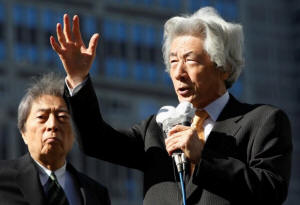|
Abe's
Fukushima 'under control' pledge to secure Olympics was a lie:
former PM
 Send a link to a friend
Send a link to a friend
 [September 07, 2016]
TOKYO (Reuters) - Japanese Prime
Minister Shinzo Abe's promise that the crippled Fukushima nuclear
plant was "under control" in his successful pitch three years ago
for Tokyo to host the 2020 Olympic Games "was a lie", former premier
Junichiro Koizumi said on Wednesday. [September 07, 2016]
TOKYO (Reuters) - Japanese Prime
Minister Shinzo Abe's promise that the crippled Fukushima nuclear
plant was "under control" in his successful pitch three years ago
for Tokyo to host the 2020 Olympic Games "was a lie", former premier
Junichiro Koizumi said on Wednesday.
Koizumi, one of Japan's most popular premiers during his 2001-2006
term, became an outspoken critic of nuclear energy after a March
2011 earthquake and tsunami triggered meltdowns at Tokyo Electric
Power Co's (Tepco) Fukushima Daiichi plant, the worst nuclear
disaster since Chernobyl in 1986.
Abe gave the assurances about safety at the Fukushima plant in his
September 2013 speech to the International Olympic Committee to
allay concerns about awarding the Games to Tokyo. The comment met
with considerable criticism at the time.
"Mr. Abe's 'under control' remark, that was a lie," Koizumi, now 74
and his unruly mane of hair turned white, told a news conference
where he repeated his opposition to nuclear power.
"It is not under control," Koizumi added, citing as an example
Tepco's widely questioned efforts to build the world’s biggest "ice
wall" to keep groundwater from flowing into the basements of the
damaged reactors and getting contaminated.

"They keep saying they can do it, but they can't," Koizumi said.
Experts say handling the nearly million tonnes of radioactive water
stored in tanks on the Fukushima site is one of the biggest
challenges.
Koizumi also said he was "ashamed" that he had believed experts who
assured him that nuclear power was cheap, clean and safe and that
resource-poor Japan had to rely on nuclear energy.
After the Fukushima crisis, Koizumi said, "I studied the process,
reality and history of the introduction of nuclear power and became
ashamed of myself for believing such lies."
[to top of second column] |

Junichiro Koizumi (R), former Japanese prime minister and a
supporter of former Japanese premier Morihiro Hosokawa (L), a
candidate of Tokyo gubernatorial election, speaks to voters atop a
van while campaigning for the February 9 vote in front of Tokyo
Metropolitan governmental building in Tokyo January 23, 2014.
REUTERS/Yuya Shino

All Japan's nuclear plants - which had supplied about 30 percent of
its electricity - were closed after the Fukushima disaster and
utilities have struggled to get running again in the face of a
skeptical public. Only three are operating now.
Abe's government has set a target for nuclear power to supply a
fifth of energy generation by 2030.
The meltdowns in three Fukushima reactors spewed radiation over a
wide area of the countryside, contaminating water, food and air.
More than 160,000 people were evacuated from nearby towns.
(Reporting by Linda Sieg and Megumi Lim; Editing by Nick Macfie)
[© 2016 Thomson Reuters. All rights
reserved.]
Copyright 2016 Reuters. All rights reserved. This material may not be published,
broadcast, rewritten or redistributed.

 |